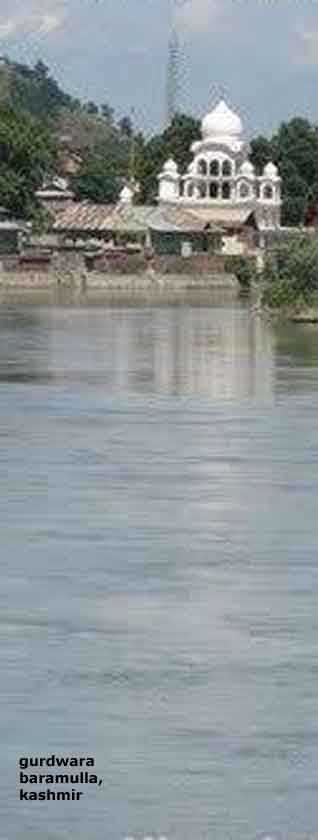People
Being a Sikh-Kashmiri
KOMAL JB SINGH
Is every Sikh a Punjabi?
Does every Sikh belong to Punjab?
No. Every Sikh is not a Punjabi and every Punjabi is not a Sikh.
These are questions I have to answer, clarify and justify every time someone new gets to know me. The dilemma is around regional identity and religion.
Needless to say, most often Sikhs are considered Punjabis and vice versa.
In the case of India, Punjab is a state in the North of India and people living there are called Punjabis. All of the major religious communities are to be found in the Indian side of Punjab.
During partition in 1947, most of the Punjabi-speaking Muslim population was either left behind in, or migrated to, the part of Punjab that is now in Pakistan. Similarly, Punjabi-speaking Hindus migrated to the Indian side.
Ideally anyone who speaks Punjabi and lives in Punjab is a Punjabi, irrespective of the religious faith.
Pre-1947and post-1947 Punjab is a historically important region in Sikhism as it is its place of origin. Sikhism has flourished in this region.
It is the same with all the religions in the world; they originate in one place and then get adopted by different regions and are coloured by their native culture.
I am a Sikh-Kashmiri woman by birth who studies at the JN University in New Delhi. I grew up like any other Kashmiri. Whenever I tell someone I am a Sikh, it is assumed that I am a Punjabi and like anyone really touchy about my region, I explain that being a Sikh has nothing to do with me being a Kashmiri.
I have to explain that I am not from Punjab, that I don’t speak Punjabi or eat typical Punjabi food. I have never seen fields of mustard and corn as this is a usual inquiry. I only know of lush orchards of apples and pears, cherries, walnuts and huge chinar trees as a Kashmiri. I have met a lot of Sikhs like me who are judged because they don’t belong to Punjab or speak Punjabi.
The dilemma does not originate solely in the relationship between being Sikh and Punjabi but in being a Kashmiri.
The general assumption is that if you are a Kashmiri-looking person, then you must be Muslim or perhaps Hindu. When I was growing up in Kashmir and studying in St. Joseph’s in Baramulla, I never felt that my identity was unknown to the world outside the valley. I was very happy having some Sikh friends and many Muslim friends.
However while studying in Aligarh Muslim University two years ago I became conscious of this fact. Most people assumed I was a Muslim because I identified myself with Kashmir. Although I was accepted as a Sikh woman, because most people think that “every Sikh is Punjabi”, questions became focused on me being Punjabi.
I would love to be thought of as a Punjabi if I was a Punjabi. After all, who would not love to be associated with such an amazing culture? What upset me was that I was not judged by who I am.
It is often said that we are not conscious of things until they affect us seriously. The dilemma of needing to prove my identity all the time has led me to write this. Being identified as a Muslim by appearance and Punjabi by name has made me conscious of the need to reflect on this. Bearing a Sikh name we can be part of many different cultures. I don’t know how many other people like me face similar problems. It’s really tough to have to explain who you are all the time.
What hurts is the fact that the stereotypical image showcased by the media often means people do not take us seriously. Stereotypes and segregation based on religion needs to be condemned and stopped. It further divides this already cracked society of ours. Religious identity and cultural identity are two different things and we need both to distinguish them from each other and to appreciate them.
So from now on, whenever you come across a Sikh, please don’t automatically relate her (or him) to Punjab and assume she is Punjabi. It is better to ask her about her native place and its culture.
As G.B Shaw once warned: “Beware of false knowledge; its more dangerous than ignorance.”
Komal jb Singh is an M.Phil. student at JN University, New Delhi, India, and her area of interests are human rights and minorities.
[Courtesy: Viewpoint. Edited for sikhchic.com]
July 6, 2013
Conversation about this article
1: R Singh (Surrey, British Columbia, Canada), July 06, 2013, 12:56 PM.
Sikhi is a universal religion, and belongs to the whole world. Sikhs have spread throughout the world, it is about time that they start sharing their extraordinary philosophical riches with others.
2: Virinder (London, United Kingdom), July 07, 2013, 3:13 PM.
Well, Komal ji, if you ever wish to visit and see Sikh-Britons, my sister would be more than happy to be a host and show you the variety of Sikh-Briton communities in this country ... all away from Punjab!
3: Fatehpal Singh Tarney (Yale, Michigan, USA), July 07, 2013, 8:56 PM.
I am a Sikh-American of Italian ancestry. I contend that our faith is not a place in northern India, nor a language; nor an ethnicity, but a set of principles guiding our behavior. Yet, I consider Punjab to be my ancestral home, spiritually speaking ...
4: Gurchandan Deep Singh (India), July 08, 2013, 9:11 AM.
i would like to add that the population of Sikhs in Punjab is now in a minority ... so it would be naive to associate all Sikhs to Punjabi culture only or to say that Punjab is a Sikh state. Sikhs are indeed universal ...
5: Gurmeet Kaur (Atlanta, Georgia, USA), July 08, 2013, 6:52 PM.
Neither of my parents nor I was born in modern-day Punjab but I do not disassociate myself with Punjab. In fact, I very proudly declare myself a Punjabi. Punjab, the home of our Gurus, who we regard higher than our biological parents, thus becomes our homeland too. Punjabi, the language our Gurus spoke, thus becomes our mother tongue. Why can't one be a Kashmiri and a Punjabi too? Why disown the Punjabi identity?
6: Rohan Singh (London, United Kingdom), January 25, 2014, 3:45 PM.
I am a Britain-born Sikh, my mum is a Sikh-Punjabi born/bred in Punjab, but my Dad was a Sikh-Kashmiri. However, my dad always spoke Punjabi right since his childhood with his family, who all spoke and still speak Punjabi among themselves and with other Sikhs. While Sikhism is not exclusive to Punjabi people, it can be said that the (vast) majority of Sikhs are Punjabi or of Punjabi descent.
7: Parthranjan Singh (Udaipur, Rajasthan, India ), December 12, 2014, 12:24 PM.
I'm a Rajasthani Sardar. I speak Mewari, and am proud to be a Rajasthani. People think I'm from Punjab, but when I open my mouth, they're confused.
8: J V Singh (United Kingdom), February 10, 2015, 9:34 PM.
Sikhism is universal and people of different races and ethnicities embrace it - not all of them can or do have Punjabi as their native language. However, most Sikh-Kashmiris DO natively speak Punjabi or rather a dialect of Punjabi known as Paharri. Since the greater/undivided Punjab region is a neighbouring region of Kashmir, there are reasonable linguistic influences. The language of Sikh-Kashmiris is influenced mainly by Paharri and Potohari dialects of Punjabi and also by Kashmiri. (Conversely, Potohari itself has influences of Kashmiri). Internally, the language spoken by Sikh-Kashmiris can vary between heavily accented (such as in Tral region) to something very close to standard Punjabi (as in the Baramulla region). It becomes clear if you look at this linguistic map of the Punjabi language: https://en.wikipedia.org/wiki/Punjabi_dialects#mediaviewer/File:Dialects_Of_Punjabi.jpg According to this particular map, the region of Jammu & Kashmir which is now in Pakistan is linguistically completely Paharri. As you go south, Majhi, Malwi and Doabi are the dialects we mostly hear from residents of the region of Punjab now in India. But when considered as a greater Punjab region, it includes many different dialects including the Paharri spoken in Kashmir. [PS: I wish I had some good references ready at hand but I'll leave that hard work to the more learned :-) But some books that do find mention of Pahari (in the context of Punjabi/Kashmir): 1) "The Indo-Aryan Languages" By Colin P. Masic; 2) "Lesser-Known Languages of South Asia: Status and Policies," Edited by Anju Saxena, Lars Bori. Note: It's worth noting that other 'hill' languages like Himachli, Garhwali, Nepali, etc are also referred to as 'Paharri' but are quite distinct from the one spoken in Kashmir. While researching one has to be careful about which 'Paharri' is being referred to.
9: Harsh Singh (New Delhi, India), December 14, 2015, 4:29 PM.
I want to learn Kashmiri-Punjabi. Where can I learn?




